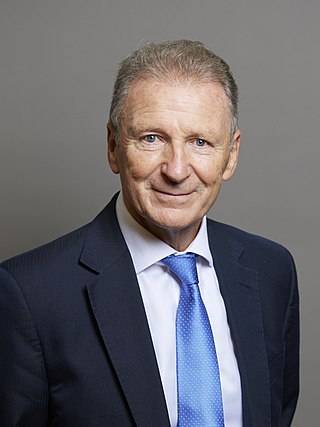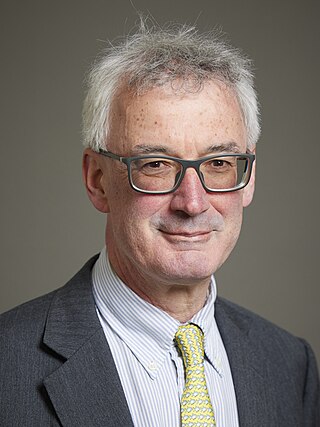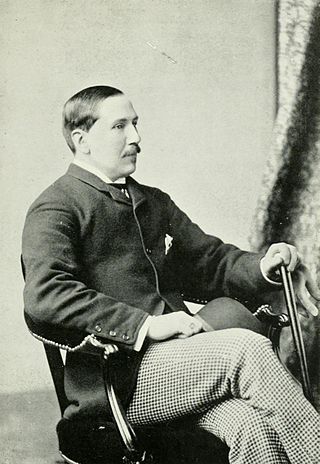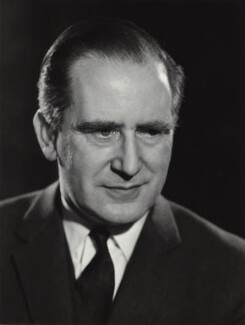Related Research Articles

The Chancellor of the Exchequer, often abbreviated to Chancellor, is a senior minister of the Crown within the Government of the United Kingdom, and head of His Majesty's Treasury. As one of the four Great Offices of State, the chancellor is a high-ranking member of the British Cabinet.

Andrew Turnbull, Baron Turnbull, is a British politician and civil servant who served as the head of Her Majesty's Civil Service and Cabinet Secretary between 2002 and 2005, when he was succeeded by Sir Gus O'Donnell. He now sits in the House of Lords as a crossbencher.
In the United Kingdom there are at least six Lords Commissioners of His Majesty's Treasury, serving as a commission for the ancient office of Treasurer of the Exchequer. The board consists of the First Lord of the Treasury, the Second Lord of the Treasury, and four or more junior lords acting as assistant whips in the House of Commons to whom this title is usually applied.

Augustine Thomas O'Donnell, Baron O'Donnell, is a former British senior civil servant and economist, who between 2005 and 2011 served as the Cabinet Secretary, the highest official in the British Civil Service.

Norman Craven Brook, 1st Baron Normanbrook,, known as Sir Norman Brook between 1946 and 1964, was a British civil servant. He was Cabinet Secretary between 1947 and 1962 as well as joint permanent secretary to HM Treasury and head of the Home Civil Service from 1956 to 1962.

The Parliamentary and Financial Secretary to the Admiralty also known as the Parliamentary and Financial Secretary to the Board of Admiralty was a position on the Board of Admiralty and a civil officer of the British Royal Navy. It was usually filled by a Member of Parliament. Although he attended Board of Admiralty meetings informally he was not made a full member of that Board until 1929. He served as the deputy to the First Lord of the Admiralty in Parliament and was mainly responsible for all naval finance and spending proposals from 1625 until 1959.

Nicholas Ian Macpherson, Baron Macpherson of Earl's Court, is a former senior British civil servant. He served as the Permanent Secretary to the Treasury from 2005 to 2016.

Sir Edward Walter Hamilton,, also known as Eddy Hamilton, was a British political diarist and Joint Permanent Secretary to the Treasury.

Robert Chalmers, 1st Baron Chalmers, was a British civil servant, and a Pali and Buddhist scholar. In later life, he served as the Master of Peterhouse, Cambridge.

William Armstrong, Baron Armstrong of Sanderstead was a British civil servant and banker.

Sir George Herbert Murray was a British civil servant.
Sir George Harrison, FRS, KCH was an English barrister and civil servant. During a tenure of twenty-one years at the Treasury, he presided over the growth of a professional civil service and an increasing transfer of power from political appointees to administrators.

Sir Thomas Whinfield Scholar is a British civil servant who served as Permanent Secretary to the Treasury from 2016 to 2022. He was previously the prime minister's adviser on European and global issues in the Cabinet Office from 2013 to 2016. He has been a director of the nationalised bank Northern Rock, and served as chief of staff for Gordon Brown.
Sir Henry William Primrose was a Scottish civil servant. He joined the Treasury in 1869, served as private secretary to the Viceroy of India from 1880 to 1884 and to Gladstone in 1886. He was secretary of the Office of Works from 1887 to 1895. He became chairman of the Board of the Inland Revenue from 1899 to 1907.
Sir Francis Mowatt was a British civil servant. He was a radical and Liberal civil servant at the Head of the Treasury. His influence was felt at a time of expansion in governmental activities.

The Department of the Permanent Secretary also formally known as the Department of the Permanent Secretary to the Admiralty or the Department of the Secretary was the Civil Service department responsible for the control, direction and guidance of all administrative functions of the British Admiralty from 1702 to 1964, it was headed by the Permanent Secretary to the Admiralty.

The Victualling Department originally known as the Department of the Comptroller of Victualling and Transport Services or the Victualling Office, also known as the Department of the Director of Victualling was the British Admiralty department responsible for civil administration of Victualling Yards and the storing and supply of Naval Victuals for the Royal Navy from 1832 to 1964.
References
- "Assistant and Permanent Secretary 1805–70". Office-Holders in Modern Britain: Volume 1: Treasury Officials 1660-1870. 1972. p. 32. Retrieved 2007-05-18.
- David Butler and Gareth Butler, Twentieth Century British Political Facts 1900–2000, Macmillan 2000, p. 306.
- ↑ McLean, Ian. "The 1909 budget and the destruction of the unwritten British Constitution". History & Policy. United Kingdom: History & Policy. Retrieved 9 December 2010.
- ↑ Macpherson, Nicholas (11 February 2014). "Scotland and a Currency Union" (PDF). gov.uk. Retrieved 12 November 2020.
- ↑ Stone, Jon (23 March 2015). "Civil servants 'compromised' their impartiality during the Scottish independence referendum with 'partisan' statements, MPs conclude". The Independent. London. Retrieved 12 November 2020.